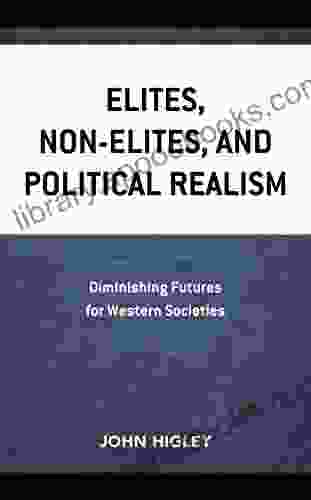Elites, Non-Elites, and Political Realism

Political realism is a theory of international relations that emphasizes the role of power, self-interest, and conflict in shaping global politics. It assumes that states are the primary actors in international relations and that they are motivated by a desire to maximize their power and security. While political realism has traditionally focused on the actions and interactions of state leaders, recent scholarship has increasingly emphasized the role of non-elite actors in shaping political outcomes.
4.8 out of 5
| Language | : | English |
| File size | : | 451 KB |
| Text-to-Speech | : | Enabled |
| Screen Reader | : | Supported |
| Enhanced typesetting | : | Enabled |
| Word Wise | : | Enabled |
| Print length | : | 164 pages |
In this article, we will explore the complex relationship between elites and non-elites in political realism. We will discuss the distinct characteristics of these two groups, their interactions, and the influence they have on political decision-making. We will also examine the implications of this relationship for political stability, social justice, and global governance.
Defining Elites and Non-Elites
Elites are individuals or groups who possess a high degree of power and influence in society. They may be political leaders, economic elites, or cultural leaders. Non-elites, on the other hand, are individuals or groups who do not have a high degree of power or influence. They may be ordinary citizens, workers, or members of marginalized groups.
The distinction between elites and non-elites is not always clear-cut. There may be individuals or groups who have some degree of power and influence, but who do not belong to the traditional elite class. Similarly, there may be individuals or groups who are considered to be non-elites, but who have a significant impact on political outcomes.
The Characteristics of Elites and Non-Elites
Elites and non-elites have distinct characteristics that shape their political behavior. Elites are typically well-educated, wealthy, and have access to powerful networks. They are often able to influence political decision-making through their connections and resources. Non-elites, on the other hand, are typically less well-educated, less wealthy, and have less access to powerful networks. They are often excluded from political decision-making processes and have less influence on political outcomes.
In addition to their material resources, elites also possess a number of intangible resources, such as social capital, cultural capital, and political capital. Social capital refers to the networks of relationships and trust that elites have with other powerful individuals and groups. Cultural capital refers to the knowledge, skills, and tastes that elites have that are valued in society. Political capital refers to the power and influence that elites have over political institutions and processes.
Non-elites, on the other hand, typically have less access to these intangible resources. They may have weaker social networks, less knowledge and skills, and less political influence. This can make it difficult for them to participate in political decision-making processes and to have their voices heard.
The Interactions Between Elites and Non-Elites
Elites and non-elites interact with each other in a variety of ways. These interactions can be cooperative, competitive, or conflictual. Cooperative interactions occur when elites and non-elites work together to achieve common goals. Competitive interactions occur when elites and non-elites compete for resources, power, or influence. Conflictual interactions occur when elites and non-elites have opposing interests and goals.
The nature of the interactions between elites and non-elites is shaped by a number of factors, including the political system, the economic system, and the social structure. In democratic political systems, elites and non-elites are more likely to interact in cooperative ways. In authoritarian political systems, elites and non-elites are more likely to interact in competitive or conflictual ways. In capitalist economic systems, elites and non-elites are more likely to compete for resources. In socialist economic systems, elites and non-elites are more likely to cooperate to achieve common goals. In societies with high levels of social stratification, elites and non-elites are more likely to interact in ways that reinforce social inequality.
The Influence of Elites and Non-Elites on Political Decision-Making
Elites and non-elites have a significant influence on political decision-making. Elites are more likely to have their voices heard in political decision-making processes. They are more likely to be consulted by policymakers, to be appointed to government positions, and to have their interests represented in legislation. Non-elites, on the other hand, are less likely to have their voices heard in political decision-making processes. They are less likely to be consulted by policymakers, to be appointed to government positions, and to have their interests represented in legislation.
The influence of elites and non-elites on political decision-making is shaped by a number of factors, including the political system, the economic system, and the social structure. In democratic political systems, elites and non-elites have more equal access to political decision-making processes. In authoritarian political systems, elites have much more influence over political decision-making processes than non-elites. In capitalist economic systems, elites have more influence over political decision-making processes than non-elites. In socialist economic systems, non-elites have more influence over political decision-making processes than elites. In societies with high levels of social stratification, elites have more influence over political decision-making processes than non-elites.
The Implications of the Relationship Between Elites and Non-Elites
The relationship between elites and non-elites has a number of implications for political stability, social justice, and global governance. On the one hand, elite rule can lead to political instability and social injustice. When elites are not accountable to non-elites, they are more likely to make decisions that benefit themselves at the expense of the broader population. This can lead to resentment and unrest among non-elites, which can ultimately lead to political instability.
On the other hand, non-elite participation in political decision-making can lead to greater political stability and social justice. When non-elites have a voice in political decision-making processes, they are more likely to support those decisions and to comply with them. This
4.8 out of 5
| Language | : | English |
| File size | : | 451 KB |
| Text-to-Speech | : | Enabled |
| Screen Reader | : | Supported |
| Enhanced typesetting | : | Enabled |
| Word Wise | : | Enabled |
| Print length | : | 164 pages |
Do you want to contribute by writing guest posts on this blog?
Please contact us and send us a resume of previous articles that you have written.
 Book
Book Novel
Novel Page
Page Chapter
Chapter Text
Text Story
Story Genre
Genre Reader
Reader Library
Library Paperback
Paperback E-book
E-book Magazine
Magazine Newspaper
Newspaper Paragraph
Paragraph Sentence
Sentence Bookmark
Bookmark Shelf
Shelf Glossary
Glossary Bibliography
Bibliography Foreword
Foreword Preface
Preface Synopsis
Synopsis Annotation
Annotation Footnote
Footnote Manuscript
Manuscript Scroll
Scroll Codex
Codex Tome
Tome Bestseller
Bestseller Classics
Classics Library card
Library card Narrative
Narrative Biography
Biography Autobiography
Autobiography Memoir
Memoir Reference
Reference Encyclopedia
Encyclopedia Michael J Makley
Michael J Makley Julia Buckley
Julia Buckley Michael Dennis
Michael Dennis John Winstanley
John Winstanley Steven Greenhouse
Steven Greenhouse John Mccrae
John Mccrae Joni Darc Shepherd
Joni Darc Shepherd Stephanie Fleck
Stephanie Fleck John Sneeden
John Sneeden John Melley
John Melley Jonathan Glennie
Jonathan Glennie John P Marquand
John P Marquand Marcus Gilroy Ware
Marcus Gilroy Ware John Edgar Browning
John Edgar Browning Marianne Sunderland
Marianne Sunderland Kev Fletcher
Kev Fletcher John Clement
John Clement Jp Lepeley
Jp Lepeley Stephen L Herman
Stephen L Herman Mike Mavrigian
Mike Mavrigian
Light bulbAdvertise smarter! Our strategic ad space ensures maximum exposure. Reserve your spot today!

 Howard PowellFinding Peace in Imperfection: A Review of Shauna Niequist's "Present Over...
Howard PowellFinding Peace in Imperfection: A Review of Shauna Niequist's "Present Over... J.D. SalingerFollow ·8.7k
J.D. SalingerFollow ·8.7k Chase MorrisFollow ·10.9k
Chase MorrisFollow ·10.9k Stephen FosterFollow ·8k
Stephen FosterFollow ·8k Leo MitchellFollow ·7.9k
Leo MitchellFollow ·7.9k Hayden MitchellFollow ·11.6k
Hayden MitchellFollow ·11.6k Herb SimmonsFollow ·8.9k
Herb SimmonsFollow ·8.9k Julian PowellFollow ·18.8k
Julian PowellFollow ·18.8k Kendall WardFollow ·14.5k
Kendall WardFollow ·14.5k

 Tyler Nelson
Tyler NelsonHer Dragon to Slay: Embark on an Epic Journey of...
In a realm where shadows dance and legends...

 Zachary Cox
Zachary Cox101 Best Marine Invertebrates: The Adventurous Aquarist's...
Unveiling the Enchanting Realm...

 William Wordsworth
William WordsworthHer Dragon Fire: Unleash the Power Within Your Soul
Embark on an...

 William Powell
William PowellUnveiling the Enchanting World of Machine Embroidery with...
Embroidery, an ancient art form that has...

 Will Ward
Will WardGolden Fire Clan Dragon Guard: A Journey into a Realm of...
Prepare to be...

 Gustavo Cox
Gustavo CoxProject Ideas to Elevate Your Hobbies and Flourish Your...
<p>Welcome to the ultimate guide to...
4.8 out of 5
| Language | : | English |
| File size | : | 451 KB |
| Text-to-Speech | : | Enabled |
| Screen Reader | : | Supported |
| Enhanced typesetting | : | Enabled |
| Word Wise | : | Enabled |
| Print length | : | 164 pages |









